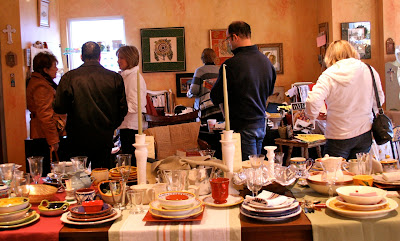Although Boston can feel far from the beaches and woods of the South Shore, in truth it’s close – it’s our city — and its cultural richness flavors our lives.
An emissary from the culinary Mecca of the city — the North End — on Sunday visited Scituate’s Roman Table, where a crowd lined up to buy her classic “The North End Italian Cookbook.” The event was one of many food-based gatherings that Roman Table owner Cynthia Gallo Casey of Norwell has hosted since opening her specialty foods and tableware shop in June.
“I love this cookbook,” said Bea Green of Scituate to author and cooking teacher Marguerite DiMino Buonopane. “I have to tell you, I learned to cook from my mother, but she didn’t write anything down. I found half her recipes in your book.”
Green’s experience reflects that of many others whose parents or relatives from Italy created dishes from memory. Cooks that can’t tell you how many cups of x, y, or z they used; how many minutes they sautéed or braised this or that: how long into a process they added additional ingredients. Cooks that cook by feel and smell and sight.
 Others at Sunday’s event had similar stories, including Buonopane. Her cookbook consists of the recipes she learned from her mother, as well as many she developed herself over a lifetime of cooking at home in the North End. In order to capture and record each of her mother’s recipes, she had to hover over her while she cooked, watching every move she made.
Others at Sunday’s event had similar stories, including Buonopane. Her cookbook consists of the recipes she learned from her mother, as well as many she developed herself over a lifetime of cooking at home in the North End. In order to capture and record each of her mother’s recipes, she had to hover over her while she cooked, watching every move she made.
“ ‘All right, Ma,’ I’d say,” Buonopane told the crowd. “‘Don’t do a thing without telling me what you’re doing. How high is the temperature? How long do you cook it?’ Then, I’d see her covering a pot without mentioning it! How did I know – do I put the cover on, do I take it off? And I’d tell her again, ‘Don’t do anything without telling me!’”
When I opened Buonopane’s cookbook, I immediately found several of my mother’s recipes (beans and potatoes; braciole just like she made it; dandelion greens; steamed stuffed artichokes). Now, what’s interesting about this is that my mother’s family comes from Calabria in Southern Italy, whereas the family of Buonopane’s mother, and her cooking tradition, comes from Rome. And Green told me that she thinks the recipes in Buonopane’s book are largely Sicilian, where her family is from.
So, this is what I’m guessing: That some of Buonopane’s recipes share ingredients and techniques common to poor Italian immigrants to America. The recipes are thus recognizable by the children (or grandchildren) of Italian immigrants as the cuisine of their ancestors’ region. But their unifying similarities actually arise from a use-what-you-have principle that depends largely on less costly ingredients — legumes, small amounts of meat and cheaper cuts, some precious Parmesan, stale bread, and whichever vegetables were available. Food writer Ike DeLorenzo has coined this style The Cuisine of Necessity.
 Buonopane’s recipes include many more sophisticated dishes, but there is a baseline here that’s worth mentioning.
Buonopane’s recipes include many more sophisticated dishes, but there is a baseline here that’s worth mentioning.The lifelong North End resident began her journey toward cookbook author by giving cooking classes and holding fund-raising lunches at the former North End Union, a settlement house on Parmenter Street.
Buonopane (whose name literally means good bread in Italian), worked as an administrator at the settlement house for 19 years, staging cooking events in her free time. Eventually, in 1975, her cooking had become so well loved locally, the Globe Pequot Press asked her to write a cookbook. The current version is the fifth revision of that original.
The Roman Table, which opened in June, is a gorgeous shop filled with choice European cooking and tableware, and a collection of high-quality specialty food items, including 30 (mostly olive) oils and balsamic vinegars.
Casey has outfitted the space with a kitchen in the rear and a large wooden tale, making it a wonderful venue for hosting small cooking classes, food tastings, demonstrations, and author events like Buonopane’s.
